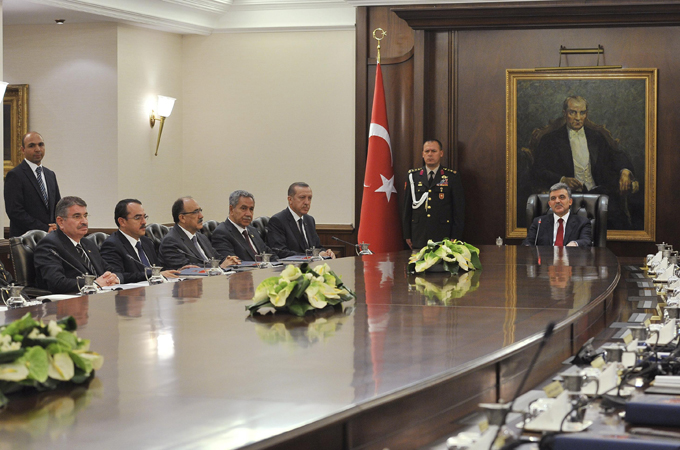
Turkish jets bomb areas of northern Iraq for second night and entering a third day following killing of nine soldiers by terrorists in Hakkari, Cukurca, on Turkey-Iraq border.
Turkey’s National Security Council spoke of the need for “better co-ordination” of the military in suppressing the PKK. Turkey has launched a second night of air strikes on Kurdish terrorists targets in northern Iraq territory, as Ankara responded to a surge in activity by Kurdistan Workers’ Party (PKK) with its first military operation in the region for more than a year.
Turkey kept pressure on Kurdistan Workers’ Party (PKK) terrorists in northern Iraq on Friday, with a rebel spokesman saying Turkish jets were carrying out air strikes for a third straight day. Turkish warplanes bombed 28 targets in northern Iraq used as bases by the banned PKK terrorist organization, the turkish military sources informed on Friday.
Turkey takes retaliation action against increasing PKK attacks
The air force launched an “effective” operation against 28 targets on the Qandil, Hakurk, Avasin-Basyan and Zap regions of northern Iraq on Thursday, the military announced in a statement on its website. The bombings by the Turkish air force lasted for around three hours on Thursday night against Qandil and other bases close to the Iraq-Turkey border.
In co-ordination with the air strikes, 96 more targets in the region were kept under intense artillery fire, the statement said. “The targets were positively identified as belonging to the PKK, and the necessary sensitivity is paid to protect civilians,” it said. “The actions under the struggle against terror will go on with determination inside and outside the country based on the requirements of military needs,” it added.
Turkey Pkk Conflict
The first strike came on Wednesday night after a deadly attack by the rebel group against a military unit in Cukurca town on Turkey-Iraq border in southeast Turkey, killing nine security officials. PKK spokesman Dozdar Hammo said no casualties had resulted from latest raid on Thursday evening, or earlier ones on Thursday morning and Wednesday night.
The terrorist cells use the mountainous region as a sanctuary from which to launch attacks in southeast Turkey. The second bombing raid by Turkey also followed a new rebel attack in the southern province of Siirt on thursday evening, killing two turkish soldiers. PKK terrorists raided two Turkish military posts by grenade and machine-gun fire, injuring three soldiers and four civilians, local security sources informed. Referring to the first night of attacks on Wednesday, the Turkish General Staff stated their artillery hit 168 targets in the region overnight before aircraft jets pounded 60 positions in two waves. Camps housing the PKK’s commanders were among those targeted, security sources informed.
The escalation in violence came as the National Security Council, which brings together senior civilian and military officials, met for five hours on Thursday before pronouncing support for a tougher action against the PKK. The council, led by Turkish President Abdullah Gul, spoke of the need for “better co-ordination” of the military and police resources in suppressing the Kurdish terror organization PKK.
The council’s statement called on Turkey’s neighbours “to accept their responsibilities” to eradicate the PKK from their territory, without naming any countries in particular. Ankara government has been revisiting its strategy against the PKK for some time. New measures being considered by the government include sending special police and professional army units to the combat zones along the border with Iraq.
Turkish Military preparing for larger operations in North Iraq
Information gathered by the police and intelligence agents will be gathered in an info pool together and the Turkish military will receive a new green-light for cross border operations en-masse under the new strategy. The PKK, listed as a terrorist group by Ankara and much of the international community, took up arms in the Kurdish majority southeast in 1984, sparking a conflict that has claimed about 45,000 lives.
According to Ankara government, there are about 2,000 rebels operating from Iraq, from where they can filter back into Turkey to launch attacks. “The attacks started again this morning (Friday) against Qandil only,” referring to an area of north Iraq close to the border with Turkey.
[adrotate banner=”33″] The Royal Mile is becoming increasingly dangerous
The Royal Mile is becoming increasingly dangerous Netanyahu’s Residence Targeted in Another Attack
Netanyahu’s Residence Targeted in Another Attack Russia Halts Gas Supplies to Austria, Marking a Shift in European Energy Relations
Russia Halts Gas Supplies to Austria, Marking a Shift in European Energy Relations Scholz speaks to Putin on the phone for the first time in two years
Scholz speaks to Putin on the phone for the first time in two years